
Is Sleep Apnea Dangerous?

Without at least six hours of deep, quality sleep, most of us feel tired, irritable, and unable to focus. Though the majority of adults in the United States aren’t getting the sleep that they need, there is a variety of reasons for this. One reason you might not be getting the sleep you need could be because of obstructive sleep apnea, or OSA. It’s estimated that up to 10% of the US adult population is living with a type of sleep apnea, but proper treatment from your dentist and conscious self-care can make a difference in your quality of life.
At Expressions in Dentistry in Folsom, California, our compassionate team of experienced professionals is committed to helping you get the rest that your body needs. Our providers’ goal is to increase your quality of life and your longevity by providing solutions that help you manage your sleep apnea and its symptoms. Left untreated, sleep apnea can exacerbate or be exacerbated by other chronic conditions, especially hypertension and diabetes.
How do I know I have sleep apnea?
If you’re a person living with Type 2 diabetes, especially if you are obese, you are at high risk of developing sleep apnea. It is possible that you have sleep apnea right now, as the symptoms are difficult to miss:
Loud snoring
Snoring occurs when the soft tissues in the upper throat vibrate. Most people will snore at some point, and a variety of reasons, including drinking, injury, and congestion can cause snoring. Snoring alone doesn’t guarantee a sleep apnea diagnosis, but loud snoring over a period of time should be enough to call your primary care doctor and your provider at Expressions in Dentistry.
Fogginess and limited attention span
When you aren’t rested, you aren’t clear, and over time, this can lead to daily problems with your concentration and your ability to stay engaged with tasks and conversations. Your memory can also be affected by frequent and long-term interrupted sleep, making you more forgetful. Interruptions in your breathing during the night prevent your blood from becoming fully oxygenated, causing you to feel fatigued, in addition to dealing with memory and recall issues.
Waking in the night
Waking in the middle of your sleep cycle is one of the strongest indicators of sleep apnea. You may wake up more frequently to go to the bathroom, or you may wake automatically when you can’t breathe. A risk factor of sleep apnea is a wide neck circumference, which puts pressure on your air passages, and stops the flow of air to your lungs.
How did this happen?
The biggest risk factor for developing sleep apnea is living with a chronic condition. Type 2 diabetes is one of the biggest contributors, but carrying excess weight, hypertension, smoking, and family history of sleep apnea and asthma are also risk factors for developing sleep apnea. Sleep apnea affects men at a higher rate than women, and Black, Native American, and Asian Americans are more likely to develop sleep apnea than are white Americans.
What can I do about this?
Our providers are ready to assist you in treating your sleep apnea. If more conservative treatments from your doctor aren’t working, we’re ready to assist with traditional treatments, like a mandibular advancement device or our revolutionary new VIVOS® system, which reshapes your airways for permanent relief.
The bottom line is that, indeed, sleep apnea is dangerous, and the sooner you seek treatment, the better. Call us today at 916-252-9186, or book an appointment with us online.
You Might Also Enjoy...


Pediatric Oral Health: 5 Invaluable Benefits of Dental Sealants

Fast Track Your Smile Straightening With FastBraces in the New Year

Help Your Smile Sparkle for the Holidays with Teeth Whitening

Advantages of Tooth-Colored Fillings Over Silver Fillings

